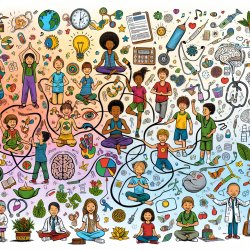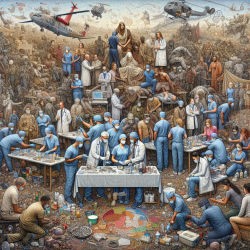The Power of Appreciation in Professional Development
In the realm of medical education and therapy services, fostering a culture of appreciation and collaboration can significantly enhance practitioner skills and outcomes. The editorial titled "Thank you to all our supporters, reviewers, authors, readers, and more" by Marcel D’Eon, published in the Canadian Medical Education Journal, underscores the importance of acknowledging the contributions of various stakeholders in medical education. This practice not only cultivates a positive work environment but also encourages continuous professional development.
Implementing Appreciation in Practice
As practitioners in the field of speech-language pathology and online therapy services, such as those provided by TinyEYE, incorporating appreciation into daily practice can lead to improved outcomes for children. Data suggests that a positive work environment, characterized by mutual respect and recognition, enhances team performance and individual job satisfaction. Here are some actionable steps to integrate appreciation into your practice:
- Regular Recognition: Implement a system where team members are regularly recognized for their contributions. This could be a simple verbal acknowledgment during meetings or a more formal recognition program.
- Feedback Culture: Encourage a culture of constructive feedback where appreciation is balanced with opportunities for improvement. This helps in creating a supportive environment that fosters learning and growth.
- Team Building Activities: Organize activities that promote team bonding and appreciation. These activities can help in understanding each other's strengths and areas of expertise, leading to better collaboration.
Encouraging Further Research
The editorial also highlights the role of research in advancing medical education. Practitioners are encouraged to engage in research activities to stay updated with the latest developments in their field. Conducting or participating in research not only contributes to personal growth but also to the collective knowledge of the profession.
For those interested in exploring the impact of appreciation and collaboration further, consider the following research areas:
- Impact of Appreciation on Patient Outcomes: Investigate how a culture of appreciation among practitioners influences patient outcomes, particularly in pediatric therapy settings.
- Collaboration in Online Therapy: Explore the effectiveness of collaborative practices in online therapy services and their impact on therapy outcomes for children.
- Interdisciplinary Research: Engage in interdisciplinary research to understand how appreciation and collaboration can be integrated across different medical and educational fields.
Conclusion
In conclusion, the practice of appreciation and collaboration, as highlighted in the editorial, is crucial for enhancing practitioner skills and improving outcomes in medical education and therapy services. By implementing these practices, practitioners can create a positive work environment that supports professional growth and better outcomes for children.
To read the original research paper, please follow this link: Thank you to all our supporters, reviewers, authors, readers, and more.










